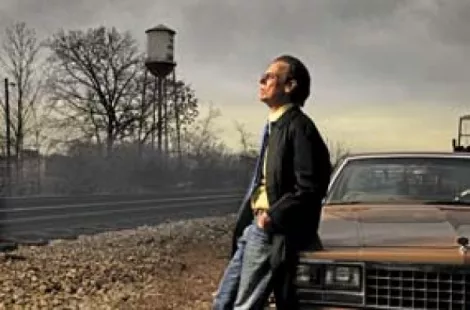
In retrospect, his answer was obvious. Hiatt has a knack for crafting/capturing riveting, viscerally human scenes centered on the pursuit of happiness. A recovered alcohol and drug abuser, the thrice-married (third time was the charm) Hiatt found joy in his family. On his breakthrough/sobriety album, Bring the Family (1987, A&M), and its likewise successful successor Slow Turning (1988, A&M), love and family became the prevalent themes in his faintly fictionalized tunes. He fearlessly lamented the past and exulted in redemption, laying bare his pain as well as his bliss, tempering both with sardonic humor, to charm fans, critics and peers, and cement his status as a songwriter’s songwriter.
Those guys have it tough. Once artists as obscure as Willy DeVille, huge as Bob Dylan and mainstream as Keith Urban cover your work, the bar is raised with each new song. Incredibly, Hiatt keeps vaulting clear over the bar like a bullfrog on Red Bull; his muse and novelist’s eye for detail remain constant.
When we talked, Hiatt’s Master of Disaster album was new. Its title track recalled his club days, specifically when he emerged from a gig at Madame Wong’s in California—“bleeding tongue, eight-ball poundin’ in my lungs”—to discover “it was already daylight.” It was the most forthcoming he’d been about those days. “I figure that everybody’s got their own demons to battle, so that’s something that anybody can relate to. No mistakes, no learning.”
Learning from mistakes—that’s really what Hiatt’s about. Love and family are just areas of his life that are ameliorated by his continued quest for personal enlightenment—or individual nirvana, which he may have reached. Same Old Man, Hiatt’s 18th album, starts with another tale of yore: “Old Days.”
Old days are comin’ back to me/ I don’t know what was so great about ’em/ I played practically free/ I had nothing live up to/ everywhere to be/ old days are comin’ back to me …
If on Master of Disaster, Hiatt looked back with shame, on “Old Days” he sees what was so great about ‘em. While he made mistakes, he also got to room with Sonny Terry, who “slept with his good eye open, peekin’ out from under the sheets,” and play with Mose Allison, who said Hiatt’s lyrics reminded him of Dadaist/surrealist poet Kenneth Patchen. He also opened for John Lee Hooker, who once walked in during Hiatt’s set to plop two gorgeous women on the stage before him. “That’s called, ‘Evenin’ son, I’m the headliner!’” So he knows there was something special about that time—now maybe he’s letting himself see that instead of his regrets?
Well, Same Old Man’s title is telling. Hiatt may have made an incremental gain in how he views his past, but he hasn’t forgotten himself. The album is stocked with those trademark “I’m a s—thead, you’re a rose” songs he does so well. He remains contrite and grateful, genuinely so, and writes about it with plainspoken elegance, like on “Love You Again.” The heart-render is akin to past acts of contrition like “Tip of My Tongue,” but while his baritone twang resounds with aching sincerity (I wanna thank you, baby /for lettin’ me back in… /for askin’ me to love you again”) one fruit of his labors—his daughter Lily—sings behind him.
It’s a nice resolution to Hiatt’s story, the upshot of a man getting his act together and enjoying the spoils. And though he’s apt to emphasize the fictional element of his work (“It’s like the fish you caught; it’s always bigger than it actually was”), John Hiatt knows what he’s doing. As he said that day, “I think you owe [your listener] a stab at being transparent… to allow [them] to see into your work.
“I just feel like if you’re gonna bother doing it, you might as well add something to life.”
JOHN HIATT w/ Joan Osborne @ Red Butte Garden, 300 Wakara Way, Sunday, Sept. 7, 7 p.m., 587-9939 tttt